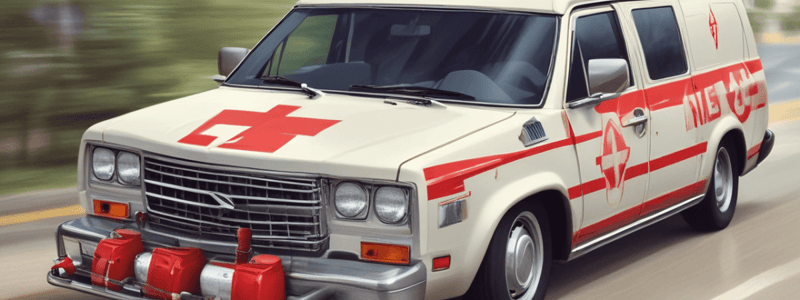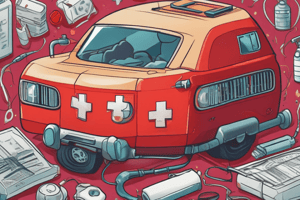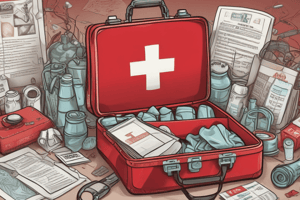Podcast
Questions and Answers
What is the first symptom of a conscious adult/child choking?
What is the first symptom of a conscious adult/child choking?
- Turning blue
- Unable to speak
- May clutch throat (correct)
- Losing consciousness
What is the primary treatment for a conscious adult/child choking?
What is the primary treatment for a conscious adult/child choking?
- 5 chest compressions and 5 rescue breaths
- CPR
- 5 back blows and 5 chest compressions
- Back blows and abdominal thrusts (correct)
What should you do if an object is visible in an infant's airway?
What should you do if an object is visible in an infant's airway?
- Remove the object with your fingers (correct)
- Blindly sweep the object out
- Perform 5 back blows and 5 chest compressions
- Give 2 rescue breaths
What should you do if a conscious passenger becomes unconscious?
What should you do if a conscious passenger becomes unconscious?
What is the first step in checking an unconscious victim?
What is the first step in checking an unconscious victim?
What is the correct sequence for checking an unconscious victim?
What is the correct sequence for checking an unconscious victim?
What is a symptom of a conscious infant choking?
What is a symptom of a conscious infant choking?
How should you position an infant when performing back blows?
How should you position an infant when performing back blows?
What is the initial step in responding to an unconscious victim?
What is the initial step in responding to an unconscious victim?
How do you check for consciousness in an adult?
How do you check for consciousness in an adult?
What is the correct sequence of the Care step in the Check-Check-Call-Care process?
What is the correct sequence of the Care step in the Check-Check-Call-Care process?
What is the first step in opening the airway of an unconscious passenger?
What is the first step in opening the airway of an unconscious passenger?
What is the correct way to check for breathing in an unconscious passenger?
What is the correct way to check for breathing in an unconscious passenger?
What is the purpose of obtaining a Pocket Mask in the Care step?
What is the purpose of obtaining a Pocket Mask in the Care step?
What is the correct way to check for consciousness in an infant?
What is the correct way to check for consciousness in an infant?
What is the first call to make in the Check-Check-Call-Care process?
What is the first call to make in the Check-Check-Call-Care process?
What is the recommended breathing rate for Child/Infant Rescue Breathing?
What is the recommended breathing rate for Child/Infant Rescue Breathing?
What should be done if breathing is detected after 2 minutes of Child/Infant Rescue Breathing?
What should be done if breathing is detected after 2 minutes of Child/Infant Rescue Breathing?
What is the primary goal of Post Resuscitation Care?
What is the primary goal of Post Resuscitation Care?
When should oxygen be administered during Post Resuscitation Care?
When should oxygen be administered during Post Resuscitation Care?
What is the final step in Child/Infant Rescue Breathing?
What is the final step in Child/Infant Rescue Breathing?
What is the primary focus of Unconscious Passenger Care?
What is the primary focus of Unconscious Passenger Care?
What should you do if a wound becomes saturated with blood?
What should you do if a wound becomes saturated with blood?
What should you do if a passenger has a puncture wound?
What should you do if a passenger has a puncture wound?
What should you do if a passenger has a sprain?
What should you do if a passenger has a sprain?
What should you do if a wound is not kept clean?
What should you do if a wound is not kept clean?
Why should a passenger with a puncture wound consider getting a Tetanus shot?
Why should a passenger with a puncture wound consider getting a Tetanus shot?
What should you do if a passenger has significant bleeding from a wound?
What should you do if a passenger has significant bleeding from a wound?
What should you do if a bandage becomes saturated with blood from a puncture wound?
What should you do if a bandage becomes saturated with blood from a puncture wound?
Why should you elevate an injured area?
Why should you elevate an injured area?
What should be done to a wound to prevent infection?
What should be done to a wound to prevent infection?
What should you do if a cut is bleeding severely?
What should you do if a cut is bleeding severely?
What should be done to a scrape that is not kept clean?
What should be done to a scrape that is not kept clean?
What should you do if an avulsion is torn partially or completely?
What should you do if an avulsion is torn partially or completely?
What is the primary goal of treating a wound?
What is the primary goal of treating a wound?
What should you do if a wound is not treated properly?
What should you do if a wound is not treated properly?
What should be done to a wound that is bleeding freely?
What should be done to a wound that is bleeding freely?
What should you do if a wound is not cleaned properly?
What should you do if a wound is not cleaned properly?
What should you do immediately if a chemical burn occurs in the eye area?
What should you do immediately if a chemical burn occurs in the eye area?
What is the primary concern when assisting a passenger with electrical burns?
What is the primary concern when assisting a passenger with electrical burns?
How should you control minor bleeding from a surface wound?
How should you control minor bleeding from a surface wound?
What should you not do when treating electrical burns?
What should you not do when treating electrical burns?
What is the first step in treating chemical burns to the skin?
What is the first step in treating chemical burns to the skin?
What should you do if a passenger has an electrical burn with an entrance and exit wound?
What should you do if a passenger has an electrical burn with an entrance and exit wound?
What is the purpose of flushing a chemical burn with clean water?
What is the purpose of flushing a chemical burn with clean water?
What should you do if a passenger has a minor bleeding wound?
What should you do if a passenger has a minor bleeding wound?
What is the primary action to take when a passenger is experiencing respiratory difficulty?
What is the primary action to take when a passenger is experiencing respiratory difficulty?
What is a key indicator of shock?
What is a key indicator of shock?
When should oxygen therapy be administered?
When should oxygen therapy be administered?
What should you do if a passenger is experiencing hyperventilation?
What should you do if a passenger is experiencing hyperventilation?
What is the primary focus of shock treatment?
What is the primary focus of shock treatment?
What should you do if a passenger is experiencing rapid/shallow breathing?
What should you do if a passenger is experiencing rapid/shallow breathing?
What is the purpose of providing high flow oxygen?
What is the purpose of providing high flow oxygen?
What should you do if a passenger is experiencing shortness of breath?
What should you do if a passenger is experiencing shortness of breath?
What is the primary purpose of the 'A' in the A, B, C assessment basics?
What is the primary purpose of the 'A' in the A, B, C assessment basics?
During landing, what should remaining Flight Attendants ensure?
During landing, what should remaining Flight Attendants ensure?
What should you do if a passenger is experiencing a stroke and has unequal pupils?
What should you do if a passenger is experiencing a stroke and has unequal pupils?
What is the correct action to take if a passenger complains of numbness or one-sided paralysis?
What is the correct action to take if a passenger complains of numbness or one-sided paralysis?
What is the purpose of using high-flow oxygen in a medical emergency?
What is the purpose of using high-flow oxygen in a medical emergency?
What should you do during a medical emergency if a passenger becomes flushed and red?
What should you do during a medical emergency if a passenger becomes flushed and red?
What is the primary purpose of using a Portable Oxygen Bottle (POB)?
What is the primary purpose of using a Portable Oxygen Bottle (POB)?
What is the correct sequence for assessing a passenger during a medical emergency?
What is the correct sequence for assessing a passenger during a medical emergency?
What is the primary symptom of a passenger experiencing respiratory difficulty due to an allergic reaction?
What is the primary symptom of a passenger experiencing respiratory difficulty due to an allergic reaction?
What should you do if a passenger is experiencing an allergic reaction and is short of breath?
What should you do if a passenger is experiencing an allergic reaction and is short of breath?
What is the primary goal of administering oxygen therapy to a passenger experiencing respiratory difficulty?
What is the primary goal of administering oxygen therapy to a passenger experiencing respiratory difficulty?
What should you do if a passenger is experiencing an allergic reaction and is unconscious?
What should you do if a passenger is experiencing an allergic reaction and is unconscious?
What is the primary treatment for a passenger experiencing an allergic reaction?
What is the primary treatment for a passenger experiencing an allergic reaction?
What should you do if a passenger is experiencing poisoning and is conscious?
What should you do if a passenger is experiencing poisoning and is conscious?
What should you do if a passenger is experiencing poisoning and is unconscious?
What should you do if a passenger is experiencing poisoning and is unconscious?
What is the primary concern when treating a passenger experiencing respiratory difficulty due to an allergic reaction?
What is the primary concern when treating a passenger experiencing respiratory difficulty due to an allergic reaction?
Study Notes
Response to Unconscious Victims
- Check the scene for safety before approaching the victim
- Check the victim's consciousness by tapping their shoulder and shouting their name (adult/child) or tapping their feet and shouting "baby, baby, are you ok?" (infant)
- Call for help by contacting STAT-MD or paging for medical assistance and bringing the AED
Check-Check-Call-Care (ABCs)
- Place the victim on their back and assess their ABCs:
- A - Airway: Open the airway using the head tilt, chin lift method (eyes to the sky)
- B - Breathing: Look, listen, and feel for breaths (10 seconds); check for chest rising and falling, hear breathing, and feel breath on the side of the face
- C - Check for Signs of Life/Circulation
CPR: Breathing
- If the victim is not breathing, obtain a pocket mask
- For child/infant rescue breathing:
- Give 1 gentle puff every 3 seconds ("Winnie the Pooh")
- Continue for 2 minutes, then reassess airway and breathing
- If breathing is detected, administer high-flow oxygen, return to caregiver, and continue to monitor
Post Resuscitation Care
- Once the victim has a pulse and is breathing, place them in the recovery position to protect the airway
- Administer oxygen and monitor ABCs
Conscious Choking
- Symptoms of full airway obstruction:
- Clutching throat
- Suddenly becoming quiet, unable to make a sound
- Look of alarm on the victim's face
- May become blue and may lose consciousness
- Treatment:
- Back blows and abdominal thrusts for adults/children
- 5 back blows and 5 chest compressions for infants
- Repeat until the object is removed or the victim becomes unconscious
Conscious to Unconscious
- If a conscious victim becomes unconscious, gently lower them to the floor and follow the Check-Check-Call-Care (ABCs) protocol
Wounds and Injuries
- Bruise: Occurs due to damage to soft tissues and blood vessels that cause bleeding under the skin.
- Treatment: Contact STAT-MD, apply a cold compress, and elevate the affected area.
Wounds-Scrape (Abrasion)
- Scrape: Skin that has been rubbed or scraped away, can easily become infected if not kept clean.
- Minimal bleeding.
- Treatment: Contact STAT-MD, clean the affected area, and apply a dry sterile dressing or band-aid.
Wounds-Cut (Incisions, Laceration)
- Cut: Commonly caused by sharp objects, can bleed freely, and can easily become infected if not kept clean.
- Treatment: Contact STAT-MD, clean the affected area, apply direct pressure to the wound, elevate the area, and apply a dry sterile dressing.
Wounds-Avulsion (Skin Tear)
- Avulsion: Portion of skin or soft tissue is torn partially or completely away, can cause significant bleeding.
- Treatment: Contact STAT-MD, clean the affected area, apply direct pressure to the wound, elevate the area, and apply a dry sterile dressing.
Wounds-Puncture
- Puncture: Caused when a pointed object pierces the skin, can cause minimal bleeding, but can be severe if object damages major blood vessels or internal organs.
- Treatment: Contact STAT-MD, clean the affected area, apply direct pressure to the wound, elevate the area, and apply a dry sterile dressing.
Injuries to Muscles, Joints, and Bones
Sprains and Strains
- Sprains: Tearing of ligament at a joint, can cause pain and immobility.
- Treatment: Contact STAT-MD, immobilize and elevate the injured area.
Chemical Burns
- Chemical Burns: Burns to skin or eye area caused by chemicals.
- Treatment: Contact STAT-MD, flush affected area with clean water for at least 15 minutes, remove contaminated clothing, and apply a sterile dressing.
Electrical Burns
- Electrical Burns: Burns from an electrical source, can cause two wounds (entrance and exit wounds).
- Treatment: Contact STAT-MD, ensure the passenger is away from the source, check breathing and pulse, and cover with a dry sterile dressing.
Bleeding
- Minor Bleeding: Surface wounds that can be controlled with direct pressure.
- Treatment: Contact STAT-MD, obtain gloves, control bleeding with direct pressure, and apply either a band-aid or bandage compress from the First Aid Kit.
Hyperventilation
- Carbon dioxide level in blood is lowered due to heavy breathing, often a result of fear or anxiety
- Symptoms: numbness or tingling in fingertips and toes, confusion, dizziness
- Actions: contact STAT-MD, calm and reassure victim, slow passenger's breathing by talking to him/her
Shock
- Symptoms: cold, clammy skin, pale, bluish skin color, weakness, rapid/shallow breathing, low blood pressure, dry mouth
- Actions: contact STAT-MD, provide high flow oxygen, have victim lie down with legs slightly elevated, maintain body temperature
Respiratory Difficulty
- Symptoms: shortness of breath, labored, rapid breathing, unusual breathing (wheezing), drowsiness, general weakness
- Actions: contact STAT-MD, maintain open airway, provide high flow oxygen, administer oxygen, watch for airway obstruction
Allergic Reaction
- Symptoms: itching or hives, difficulty breathing, tightness in chest, wheezing, swollen face/tongue, swelling in throat
- Actions: contact STAT-MD, monitor victim constantly, provide high-flow oxygen if short of breath, keep sitting upright, seek medical attention immediately
Poisoning
- Symptoms: burns or stains around victim's mouth, unusual breath or body odors, abnormal breathing/pulse rate, dilated or constricted pupils, vomiting/diarrhea, abdominal pain
- Actions: contact STAT-MD, maintain open airway, try to determine what was taken, provide high flow oxygen, seek medical attention
Automatic External Defibrillator (AED)
- AEDs are available on FR2 and FRX
Medical Emergencies and Treatments
- Assessment basics: A-Airway, B-Breathing, C-Check for Signs of Life/Circulation
Administering First Aid During Landing
- Flight Attendants may continue providing care during landing, not in jumpseat
- Remaining Flight Attendants will ensure both "A" and "B" jumpseats (doors) are covered
Sudden Illness
- No specific information
Stroke
- Symptoms: flushed, red appearance, confusion, headache, one-sided paralysis, unequal pupils
- Actions: contact STAT-MD, administer high-flow oxygen, keep at rest with head slightly elevated, give nothing by mouth, monitor airway
Studying That Suits You
Use AI to generate personalized quizzes and flashcards to suit your learning preferences.
Related Documents
Description
Learn how to respond to unconscious victims with the Check-Check-Call-Care method, including checking the scene for safety and the patient's consciousness.




